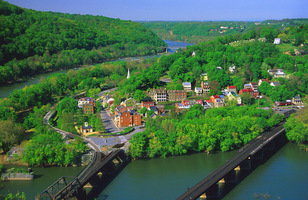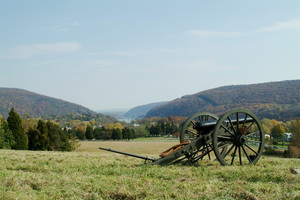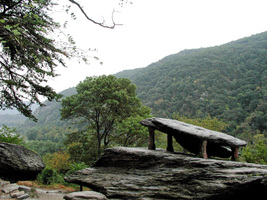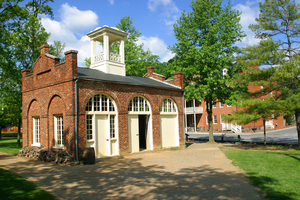 | Back to e-WV
| Back to e-WV
 The West Virginia Encyclopedia
The West Virginia Encyclopedia
 | Back to e-WV
| Back to e-WV
 The West Virginia Encyclopedia
The West Virginia Encyclopedia
The Shenandoah and Potomac rivers meet at the easternmost and lowest point in West Virginia, where in 1763 the Virginia Assembly established the town of “Shenandoah Falls at Mr. Harper’s Ferry." Robert Harper’s home is now the oldest building in the Lower Town, the focal point of Harpers Ferry National Historical Park. The private Upper Town, which itself is a Historic District, overlooks the rivers and the Lower Town from steep hills above. The footbridge crossing the Potomac River at Harpers Ferry is one of the most unusual parts of the Appalachian Trail, which has its headquarters in the town.
Harpers Ferry has been visited by numerous notables. A partial list includes George Washington, who surveyed the area; Thomas Jefferson, who passed through with his daughter on their way to the Continental Congress; Meriwether Lewis, who collected arms and other supplies at the armory and in the town for his journey to the Northwest Territories with William Clark; Abraham Lincoln, who reviewed troops there in October 1862; and Union General Philip H. Sheridan, who had his headquarters in the town for a time.
The two most famous episodes in Harpers Ferry’s history also were critical events in the nation’s history. In October 1859, abolitionist John Brown and about 20 followers unsuccessfully tried to seize the 100,000 weapons in the federal armory at Harpers Ferry. They had hoped to use the guns to start an armed insurrection among slaves. Those of Brown’s followers who were not killed in the raid were captured, tried for treason against the Commonwealth of Virginia, and hung, as was Brown.
During the Civil War, Harpers Ferry changed hands eight times. For a while it became a Union garrison and destination for runaway slaves.
Storer College, a product of the Reconstruction Era following the Civil War, was established in 1867 in Harpers Ferry by the Freewill Baptist Church to educate freed slaves in the Shenandoah Valley. Frederick Douglass was a trustee of the college. W.E.B. DuBois chose the college’s campus as the site of the second conference of the Niagara Movement in 1906. The college closed in 1955.
The town became a national monument on June 30, 1944, and a national historical park on May 29, 1963. Visitors now can see John Brown’s Fort; arsenal square; Storer College; and Jefferson’s Rock, where Thomas Jefferson said the sight of the two mighty rivers meeting in the mountains is “perhaps one of the most stupendous scenes in nature.” Many of the buildings in the Lower Town have been restored to circa 1859 and contain shops and museums dedicated to the Civil War, John Brown, and Meriwether Lewis. Away from the Lower Town, the park also includes several sites important in the Civil War.
The park offers activities for adults and children, hiking trails, and tours. It is open daily from 8 a.m. to 5 p.m. and closed Thanksgiving Day, Christmas Day, and New Year’s Day. The fee for entry into the park is $6 per vehicle or $4 per person arriving by foot or bicycle.
Harpers Ferry is a good place to start or end a leg of the Appalachian Trail because it is one of the few towns through which the trail passes. About four miles of the trail fall in West Virginia near Harpers Ferry. The trail then crosses the Shenandoah River and follows Loudoun Heights and the Virginia-West Virginia border for 15 miles. It moves back into West Virginia, or at least along the border, near the New River.
Harpers Ferry is served by Amtrak and commuter trains to Washington, D.C. There is a variety of accommodations. The historic Hilltop House Hotel is closed for renovations, but there are several motels, camp grounds, and bed and breakfasts. For more information, visit the Jefferson County Convention and Visitor’s Bureau website at http://www.wveasterngateway.com.
Written by Jennifer Bundy

Caption: Harpers Ferry
Credit:
Courtesy Of: WV Division of Tourism (WVDT)
Caption: Murphy Farm is one of several sites outside Harpers Ferry included in the National Historic Park
Credit:
Courtesy Of: National Park Service
Caption: Many of the buildings in Harpers Ferry's Lower Town have been restored to circa 1859
Credit:
Courtesy Of: National Park Service

Caption: Bolivar Heights is part of Harpers Ferry National Historic Park
Credit:
Courtesy Of: National Park Service
Caption: Anthony Hall at Storer College
Credit:
Courtesy Of: National Park Service

Caption: Thomas Jefferson said the sight from Jefferson Rock, of the two mighty rivers meeting in the mountains, is “perhaps one of the most stupendous scenes in nature.”
Credit:
Courtesy Of: National Park Service
Caption: Aerial view of Harpers Ferry
Credit:
Courtesy Of: National Park Service

Caption: John Brown's Fort
Credit:
Courtesy Of: WV Division of Tourism
Caption: Hilltop House
Credit:
Courtesy Of: